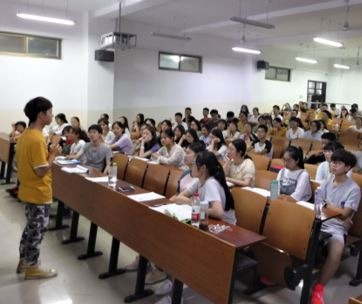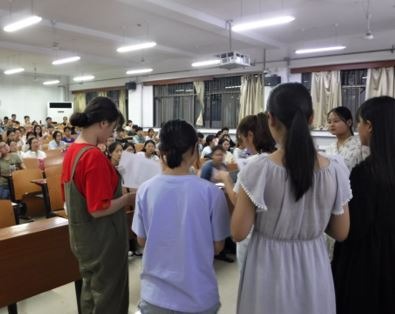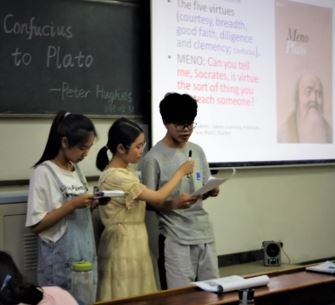by Peter Hughes
As like many Universities in China, Open Lectures are often given by foreign teachers. I teach Civil Engineering and English to undergraduates in China at the Henan Polytechnic University (HPU). With its long history, it is the first mining university in Chinese history as well as the earliest higher college in Henan province. With a weeks notice I was asked to contribute to the open lecture programme and submit my topic. This was an opportunity to escape from core texts and a true challenge to inspire my students.

From Confucius to Plato
From Confucius to Plato is of great interest to me at the moment and it was tempting to pick such a topic, firstly because it was a fascinating subject to me and secondly it would be something new and unique for my students. It was also an opportunity to discuss a personal journey, a journey discovering and comparing eastern and western Philosophy. Arriving in Asia in 2014, I have always been interested in Asian culture, tradition and eastern Philosophy. I have enjoyed reading books and many research papers on the teachings of Confucius.
I intended to highlight the teaching of Confucius, focusing on bringing order back to the people. I wanted to discuss quotes such as “To do to others as you would have them do to you”, touching on humaneness, humanity, benevolence, virtue, kindness and goodness. My literature review for my PhD did cover western Philosophy including Homer and Plato and ever since then I have had a passion for culture, history and philosophy. I planned to discuss and compare Confucius with Plato, focusing on western humanism, love of wisdom, justice, beauty, and equality, social, political, and moral issues as also virtues such as courage, justice, piety, modesty or temperance, and wisdom.
Student Interaction
Student interaction is very important to me and a vital consideration when planning lessons and presentations. I was going to add a personal angle to the teachings of Confucius by inviting a student to give his personal viewpoint on the influence of Confucius as a child, and on the current and future relevance of Confucianism and there was no shortage of volunteers.
To add background to the discussion, I planned two readings from the Chinese classic ‘Romance of The Three Kingdoms’ and I asked one of my private students, the eight year old daughter of a colleague to read a passage. This was quite a challenge for a Chinese child to read in front of a packed lecture hall.
Two groups of undergrads were going to recite a dialog from Lun Yu (The Analects Book 12) and from Plato’s Meno, both with a common theme of virtue and I planned to end with an holistic model of Confucius and Plato’s thoughts on virtue and students questions.
I started my presentation in amongst the audience, clarifying definitions. We established definitions of philosophy (love of wisdom), Latin, virtue, the Jesuits and the Ten Commandments. I was aware that my contract of employment forbade me to ‘preach my faith’ and China is an atheist country.

Confucius
My first student speaker (figure 1.) spoke eloquently on his own childhood and the importance of the teachings of Confucius. He outlined the Confucius institutes around the world and their contribution to education and the Chinese language in a modern world.
I made a brief introduction to the life and works of Confucius, being aware that my audience was educated and well versed in the subject. I clarified that my discussion was based on a translation of Lun Yu into English ‘The Analects’ (Conversations) by the Jesuits.
She was amazing. She stood and faced the crowd and read a short passage from Romance of The Three Kingdoms.
Confucius lived in tumultuous times, many wars were waged between states, a period known as the spring and autumn of the Zhou dynasty. This led to my second speaker, she read the preface to Romance of The Three Kingdoms. The story is set in the late years of the Eastern Han dynasty (AD 25-220), outlining corruption of the state administration, exacerbated by years of famine, which meant that ordinary people lived a very hard life. Against this background of terror and unrest, Confucius and his later apostles strived for change in thought and deed.
Then came my third address from a student, my confident capable eight year old. She was amazing. She stood and faced the crowd and read a short passage from Romance of The Three Kingdoms. Her text explained how Mi Heng could compare himself in virtue with Confucius and Yan Hui (two great philosophers), this little Chinese infant spoke beautifully and received worthy ovation.
Confucian virtues
When I first started reading about Confucius I felt I knew his teachings in a strange and distant form, they seemed to resonate and stir memories of my Catholic education and upbringing (long ago) at home in England. I cautiously shared these private thoughts with my audience. I shared an example of a famous well documented Confucius and Christian thought “Do to others as you would have them do to you”. I qualified by saying it can be found in antiquity. Before Jesus walked the earth, similar sentiments existed in ancient Confucianism, Buddhism, Hinduism, and Greek philosophy (Plato).
I proceeded to Confucius and The Five Virtues. The Confucian central virtue is Ren, variously translated as “humaneness,” “humanity,” “benevolence,” “virtue,” “kindness” and “goodness”. It is not a single virtue but a combination of many virtues. Asked what Ren is, Confucius replied that it is the practice of the five virtues (courtesy, breadth, good faith, diligence and clemency). In practicing ren, one will become what Confucius regarded as the ideal person.
Lun Yu – A Dialog by students (figure 2.) followed in which Yen Yuan asks the Master (Confucius) about the perfect virtue. He answered “To subdue himself and return to Propriety “. I concluded discussions on Confucius by stating the whole foundation of the traditional Chinese Confucian ethical order was based on the ideal of self-cultivation to discover what is morally right, that is the way of heaven. From a personal view I noted the apparent acceptance of heaven in an atheist culture. Confucius suggested that the way to heaven is through the study of the tradition, literature, rites, and music of the past (especially of the Zhou dynasty). It was believed that “self-cultivation alone could solve all political problems and usher in the perfect society”.

Plato
It was now the time to turn to the great Plato (The Greek philosopher) born 428 BC (Confucius 551 BC) student of Socrates, teacher of Aristotle. It was at this point that I had a distracting thought. In China, ‘BC’ is referred to as ‘Before Century’, I settled for just ‘BC’.
I compared a fundamental difference to my students, Confucius went out around China to his people (thinking rather like Christ) unlike that of Plato who was based in his Academy
Plato’s Academy, founded in the 380s was the ultimate ancestor of the modern western university (hence the English term academic). An influential centre of research and learning, it attracted many men of outstanding ability. I compared a fundamental difference to my students, Confucius went out around China to his people (thinking rather like Christ) unlike that of Plato who was based in his Academy.
I progressed to Plato’s conception of philosophy. An important aspect of this conception, one that has been shared by many philosophers since Plato’s time, is that philosophy aims not so much at discovering facts or establishing dogmas as at achieving wisdom or understanding closely inline with Confucianism. Plato’s own conventional set of virtues were then discussed. By Plato’s time a conventional set of virtues had come to be recognized by the larger culture.They included courage, justice, piety, modesty or temperance, and wisdom. Confucius reflected his virtues as courtesy, breadth, good faith, diligence and clemency. Plato undertook to discover what his virtues really amounted to.
A dialog recited by students followed taken from Meno by Plato (figure 3.). The overriding theme being virtue taken and accepted as a whole, Meno was a visiting politician, Socrates Plato’s teacher. It started with Meno “Can you tell me, Socrates, is virtue the sort of thing you can teach someone?”. Early Greek people began their thought by studying nature and those are called the natural philosophers. Plato’s attention was shifted to social, political, and moral issues even more closely associated with Confucius.

The beginning of western humanism
This shift is regarded as the beginning of western humanism.
My presentation concluded with comparisons of Confucius and Plato’s thoughts on virtue by way of an holistic model. The model graphically demonstrated the similarities of Confucius and Plato of similar times but a world apart. A 15 minute question time had to be closed and further questions were to be discussed by email and on our journey home across campus. I will always remember the student leaving the hall tentatively whispering to me that his mother was a Christian and that he was also aware of the links between western Christianity and Confucianism. It was most interesting and revealing to compare West and East, the two great men, their ideas and their influence on subsequent history. Reading the positive feedback from the students, I feel they enjoyed our evening and look forward to our next discussion. By comparing western and eastern philosophy in the presentation and discussion, I hoped to assist my students with a deeper understanding of their own marvelous traditions, culture and identity.




